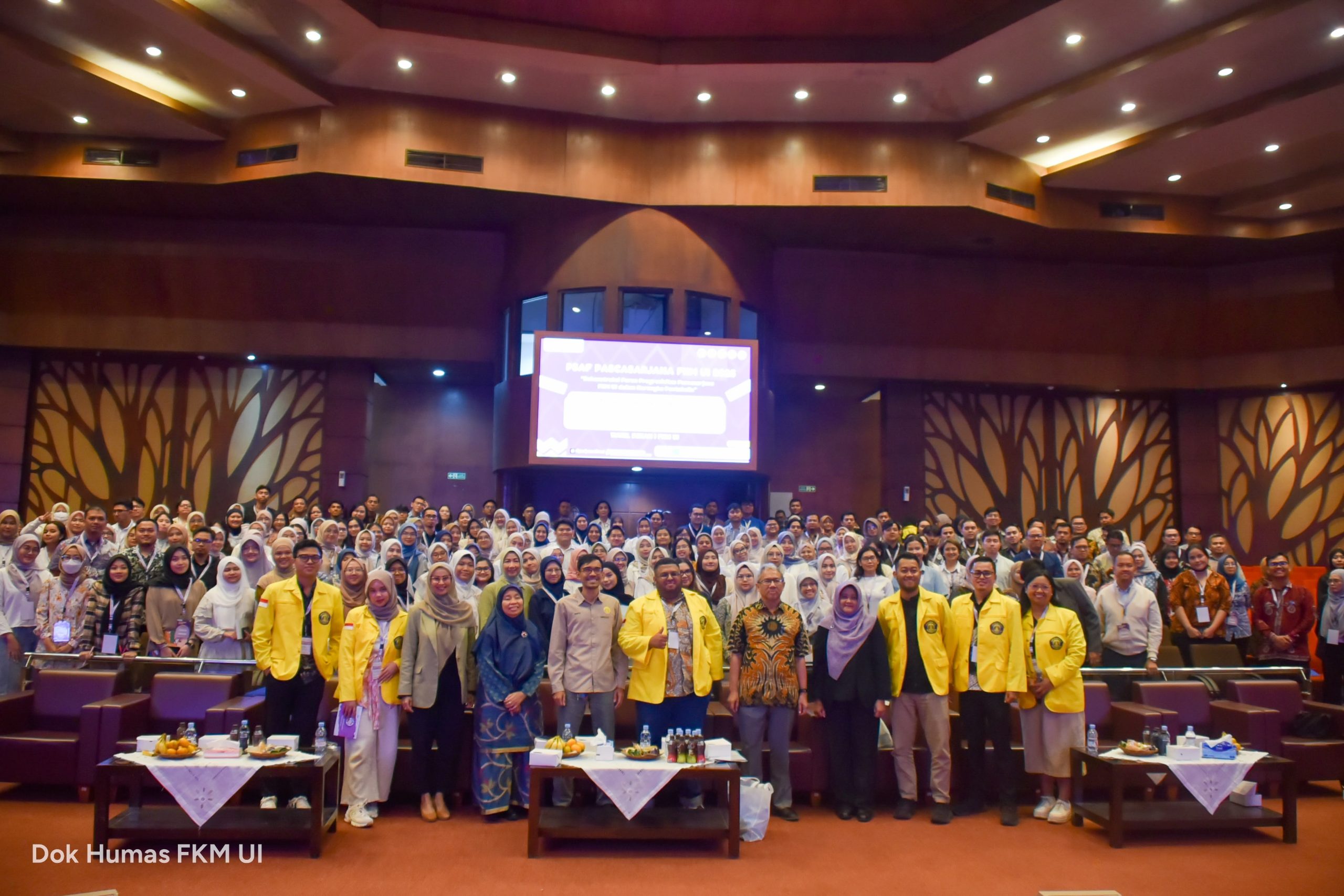Depok, August 13–14, 2025 — The Faculty of Public Health (FPH) Universitas Indonesia (UI) welcomed its new postgraduate students through the 2025 Faculty Academic System Orientation (PSAF) for Postgraduate Programs, carrying the theme “Reconstructing the Progressive Role of FPH UI Postgraduate Studies within the Pentahelix Framework” and the tagline “Scholars, Intellectuals, and Catalysts of Benefit.”
The event was held in a hybrid format at the Universitas Indonesia Convention Center, attended by 300 new students, with 193 joining onsite and the rest participating online via Zoom.
The program began with a report from the Chair of the 2025 Postgraduate PSAF Committee, Wafi Syukri Baraja, S.K.M., who emphasized the importance of progressive spirit for all postgraduate students from the start of their studies. “Quoting Antonio Gramsci, those of us who have entered the intellectual stage must become organic intellectuals. We must not enter without being progressive in our movement. Postgraduate students of FPH UI must be scholars who return to society and generate tangible benefits for others. That is why our tagline is ‘Scholars, Intellectuals, and Catalysts of Benefit,’” he remarked.
Dean of FPH UI, Prof. dr. Mondastri K. Sudaryo, M.S., D.Sc., in his opening address, reminded students of the importance of adaptability. “Dear new students, we congratulate you on becoming part of the big UI family, part of the big FPH UI family,” said Prof. Mondastri. He stressed that success at the postgraduate level requires adaptability through three main processes: learn, unlearn, and relearn. “Postgraduate learning is not just about gaining new knowledge but also about leaving behind outdated knowledge and embracing new, relevant perspectives,” he continued.
PSAF served as an introduction to both academic and non-academic environments at FPH UI, as well as the first step in student engagement and recruitment into the FPH UI Student Association. New master’s and doctoral students were introduced to essential systems such as SSO, SIAK NG, EMAS2, and the various non-academic facilities provided at FPH UI.
Curriculum orientation was delivered by Dr. Ir. Asri Setiarini, M.Sc., Vice Dean for Education, Research, and Student Affairs at FPH UI. She explained the latest curriculum aligned with Ministry of Education regulations. For the Master’s Program, students must complete a minimum of 54 credits within 4 to 8 semesters. The 16-credit final project may take the form of a thesis, prototype, or project, aligned with program learning outcomes. “Research results must be disseminated through publication in reputable international journals (Q1 or Q2), seminars, patents, or other downstream outputs. Students may also take cross-program courses, either within or outside FPH UI, with an official faculty recommendation,” explained Dr. Asri.
Meanwhile, the Doctoral Program requires a minimum of 88 credits to be completed within 6 to 12 semesters. “Doctoral students will be assigned both a supervisor and co-supervisor aligned with their research field. International publications are a graduation requirement, and for the pure research track, higher achievements are expected,” she added.
The PSAF also featured an interactive discussion. Dikandu Lintar, a Master’s student in Public Health, asked about the possibility of graduating within three semesters, while Fikri, a Doctoral student, inquired about lecture formats and strategies to shorten study duration. Dr. Asri clarified that minimum study periods are regulated, hybrid learning flexibility is available with lecturers still present on campus, and timely graduation requires early planning. “The key to graduating on time is planning from the start—understand your study map, plan your research strategy, and begin writing publications early,” she emphasized.
Following the curriculum session, students continued to the Program Chair Sessions (KPS) to engage directly with Heads of Study Programs, learning more about specializations and research opportunities. These sessions provided a platform for new students to receive strategic academic guidance.
Through the 2025 Postgraduate PSAF, FPH UI aspires for its postgraduate students to maximize their study period as a time for strengthening academic capacity and building cross-sectoral collaboration networks. With the spirit of the Pentahelix, graduates are expected to become excellent and impactful agents of change, contributing significantly to the advancement of public health at local, national, and global levels. (EAR)

